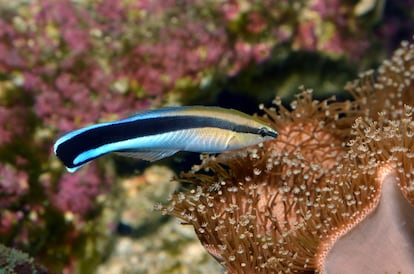Is the little cleaner fish the smartest one on the reef?
The ‘Labroides dimidiatus’ takes care of its reputation by providing a personalized service to its clients, has a long-term memory, caresses predators, changes sex and recognizes itself in the mirror

In recent years, science has been paying increased attention to a peculiar reef-dwelling fish whose cognitive abilities never cease to amaze. It is the bluestreak cleaner wrasse (Labroides dimidiatus), commonly known as the cleaner fish, a successful underwater entrepreneur who receives visits from numerous clients.
Different species of fish come to its cleaning station to have their skin groomed, ridding themselves of the parasites it feeds on in a win-win encounter in which the customer gets spruced up and the cleaner gets to eat. However, there is a nuance that makes the relationship a bit more complex: the cleaner likes the customer’s tasty layer of mucus better than its parasites, but the customer hates having its precious mucus removed.
The cleaners are usually in high demand, receiving up to 2,000 visits a day. While the fish wait for their turn, they watch the cleaner work. Whenever clients notice their mucus being eaten, they shake their body; this makes it easy for observers to detect if a cleaner is professional in its work or if it gives in to temptation too often.
Laboratory studies show that customers prefer the services of the cleaners that cause little twitching. In turn, when a cleaner is being watched by other fish, they tend to act more professionally than when no one is watching. No doubt about it: the cleaner fish, as the expert that it is, takes care of its reputation.
Developing this behavior is no easy feat, as it requires self-control. One study evaluated the cleaner with a test often used to assess this ability in animals: delayed gratification. In broad terms, it consists in giving an animal a choice between an immediate reward and another that takes longer, but is better. In order to eat the latter, the animal must be able to control itself and not take the immediate reward. The cleaner fish passed the test with similar results to those of monkeys.
As is the case with the mammalian brain, the cognitive abilities of some cleaner fish vary by sex: males are better at some learning tasks and females at self-control. The most surprising thing is that these animals change sex. Each specimen is born as a female and only becomes a male when it is the largest individual in the group. Their cognitive abilities are also altered with the sex change.
Taking care of customers
The job of the cleaner fish is quite complex. The species that visit its station can be divided into two types: residents and travelers. The resident species are loyal customers who, being from the neighborhood, always go to the same cleaning station. In contrast, traveling species have home ranges that cover several stations, so they can choose where they go. So, what does this businessfish do? It deals with the travelers first and takes care of the regular customers later.
Once again, we face a behavior that could require complex cognitive abilities. To assess them, the cleaner has been put through another test: the ephemeral reward. Food is served in two containers that are identical, except for the color. One of them is permanent, but the other is removed after a few seconds. If the animal chooses to eat from the ephemeral container first, it can also eat the contents of the other, but if it starts with the permanent one, it will only be able to eat from that one. The cleaner fish passed this test with flying colors, even beating chimpanzees and orangutans.
One interesting fact is that this ability is not programmed in the genes; instead, it depends on environmental factors, such as the density of cleaners in a specific area. When it is high, the stations of the cleaners are not as crowded, so they do not need to choose between traveling and resident customers. These less busy cleaners fail the ephemeral reward test, and their frontal brain size is smaller.
But the poor resident fish that go to the most crowded stations are not only treated worse because they are not a priority; they also suffer abuse from the cleaner fish, which tends to eat more of their mucus. The resident customers often get so angry that they end up chasing the cleaner. When this happens, the businessfish knows that it has crossed the line and tries to fix things by taking excellent care of them in the next few cleanings.
Fish brain
To develop this behavior, the cleaner fish not only needs to recognize their customers individually; it also needs to have a good memory. One study showed that the cleaners can remember an unpleasant event some time later. In order to carry out the experiments, fish are sometimes caught in the wild with nets, and they are returned to the sea once the study is finished. The first time, capturing the cleaner is easy, as it is not afraid of the net. However, those who have already been caught once hide among the rocks when they see the nets, even eleven months later.
This animal also caters to predatory fish. In these cases, it has been observed that, before the procedure, it caresses them with its body and its fins. The purpose of this could be to please its dangerous client in order to avoid a scare, as it has been shown that fish also perceive tactile stimulation in a positive way. In addition, when the cleaner is chased by an irate customer, it will often go near a predator and caress it. In this way, it manages to escape unharmed.
At this point, we might think that the Labroides dimidiatus can no longer surprise us, but we would be wrong. In 2019, a study showed that the cleaner recognized itself in the mirror. They placed an orange mark, mimicking a skin parasite, on the heads of several cleaner fish, and a clear mark on others. Only those with the orange mark scraped their heads against the floor after looking in the mirror. This test is used as evidence that animals have self-awareness, although the authors of the study are cautious in drawing these conclusions.
These discoveries are as fascinating as they are difficult to explain. How can a fish whose brain is no bigger than a lentil pass all these complex tests? We are talking about an animal with a brain-to-body ratio ten times smaller than that of any mammal. We may not be able to explain it yet, but when we do, we will have a better understanding of intelligence.
Sign up for our weekly newsletter to get more English-language news coverage from EL PAÍS USA Edition
Tu suscripción se está usando en otro dispositivo
¿Quieres añadir otro usuario a tu suscripción?
Si continúas leyendo en este dispositivo, no se podrá leer en el otro.
FlechaTu suscripción se está usando en otro dispositivo y solo puedes acceder a EL PAÍS desde un dispositivo a la vez.
Si quieres compartir tu cuenta, cambia tu suscripción a la modalidad Premium, así podrás añadir otro usuario. Cada uno accederá con su propia cuenta de email, lo que os permitirá personalizar vuestra experiencia en EL PAÍS.
¿Tienes una suscripción de empresa? Accede aquí para contratar más cuentas.
En el caso de no saber quién está usando tu cuenta, te recomendamos cambiar tu contraseña aquí.
Si decides continuar compartiendo tu cuenta, este mensaje se mostrará en tu dispositivo y en el de la otra persona que está usando tu cuenta de forma indefinida, afectando a tu experiencia de lectura. Puedes consultar aquí los términos y condiciones de la suscripción digital.









































